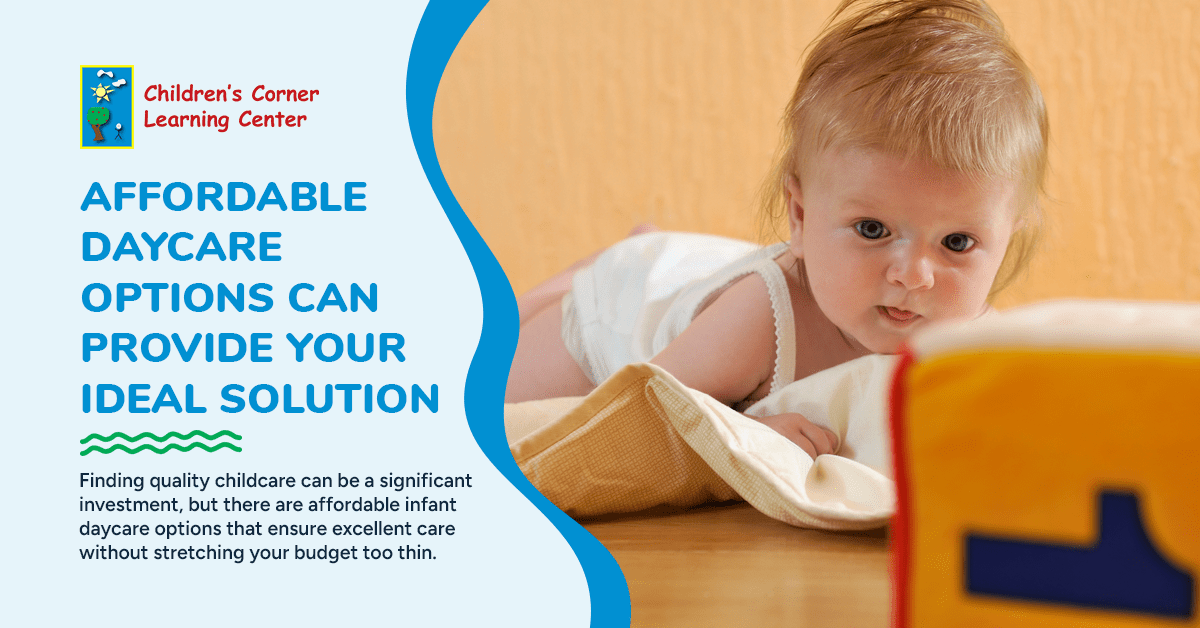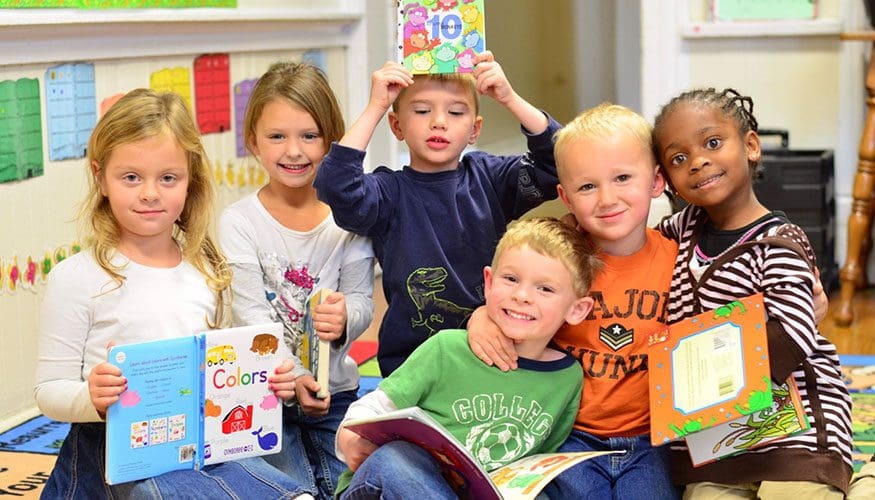Finding the best daycare for infants near me can feel overwhelming, especially when searching for a place to nurture and support your child’s growth. As a parent, you want a daycare that prioritizes safety and health and encourages early learning through play and exploration.
Look for centers that foster a warm, welcoming environment where individualized attention helps infants reach developmental milestones at their own pace. With the right daycare, you’re giving your infant a foundation of security, learning, and joy, setting them on a path of continuous growth.
Check Infant Daycare Reviews for Insight
When searching for the best daycare for your infant, checking infant daycare reviews is essential. Reviews offer firsthand insights from other parents and can help you understand what each daycare provides. With so many choices available, understanding what makes a daycare stand out—or fall short—can be invaluable.
Why Reviews Matter
Reviews allow you to see beyond the polished website photos and promotional materials. They highlight real experiences, from how well caregivers interact with infants to the quality of the daycare’s facilities. Many parents are specific about what they loved or felt could be improved, providing you with honest feedback that can guide your decision.
Where to Find Trustworthy Reviews
While popular sites like Google Reviews and Yelp are often helpful, specialized childcare review platforms like Care.com and Winnie are also available. These platforms provide detailed reviews and usually allow parents to rate specific aspects, such as cleanliness, staff qualifications, and overall atmosphere. Some local parenting groups on social media can offer insider information and personal experiences. Here’s where to look:
- Google Reviews and Yelp: Broad reviews that cover a range of daycares.
- Care.com and Winnie: Childcare-focused platforms with detailed daycare profiles.
- Parenting groups on social media: Firsthand accounts from local parents.
Red Flags to Watch For
As you sift through reviews, you must be mindful of red flags that may signal potential issues. Watch for recurring mentions of high staff turnover, affecting your infant’s consistency in care and comfort. Reports of poor communication with parents or concerns over cleanliness and safety should also be taken seriously. Here are some red flags to consider:
- High staff turnover: Lack of continuity can disrupt infants’ routines.
- Poor communication: Issues with sharing updates or responding to concerns.
- Cleanliness or safety concerns: Any mention of neglect in these areas is a serious issue.
Taking the time to read through infant daycare reviews can help you make a more informed choice. By learning from the experiences of other parents, you’ll feel more confident selecting a daycare that meets your child’s needs.
Consider Affordable Infant Daycare Options

Finding quality childcare can be a significant investment, but there are affordable infant daycare options that ensure excellent care without stretching your budget too thin. The key is to weigh affordability with quality, ensuring your child has a safe, nurturing environment to grow in without compromising on essential aspects of care.
Understanding What Impacts Daycare Costs
The cost of infant daycare can vary based on location, caregiver-to-child ratio, and additional services. Centers in urban areas may have higher prices due to higher overhead costs, while rural or suburban options might be more budget-friendly.
Additionally, daycares with lower caregiver-to-infant ratios or specialized programs may have a higher price tag. Knowing these variables helps you choose a daycare that meets your expectations.
Affordable Daycare Options to Consider
Affordable daycare doesn’t mean settling for subpar care. Many reputable options offer quality programs designed to support your infant’s development. Here are a few options that may help you find the right fit:
- Family Child Care Homes: Licensed in-home daycares are often more affordable than larger centers. These providers usually have smaller group sizes and can offer personalized care.
- Nonprofit Daycare Centers: Many community organizations and nonprofits operate daycare centers with subsidized rates, offering high-quality care at a reduced cost for eligible families.
- Sliding Scale and Subsidy Programs: Some daycare centers adjust their rates based on income, while government subsidies and vouchers can help cover a portion of daycare costs for qualifying families.
Financial Assistance and Tax Benefits
Parents should also look into financial assistance programs and tax benefits that can make daycare more affordable. For example:
- Child Care Subsidies: Government programs, such as the Child Care and Development Fund (CCDF), offer subsidies that help lower-income families afford daycare.
- Dependent Care FSA: Some employers offer Flexible Spending Accounts for dependent care expenses, allowing you to set aside pre-tax dollars to cover daycare costs.
- Child and Dependent Care Tax Credit: This tax credit allows parents to claim a portion of daycare expenses, reducing the overall financial burden.
Exploring these affordable options and financial resources can make finding a high-quality daycare more accessible. This ensures your infant receives nurturing care without sacrificing your family’s economic stability.
Explore Infant Care Programs Near Me
Exploring infant care programs near me is essential to finding the right environment for your child’s early development. High-quality infant care programs offer a structured yet nurturing setting where infants grow, learn, and thrive. Knowing what to look for in these programs can help you make a confident choice based on your family’s needs and values.
Types of Infant Care Programs
Understanding the variety of infant care options available can help you decide what will best support your child’s growth. Common types of infant care programs include:
- Center-Based Daycare: Larger daycare centers provide a structured environment with trained staff and often offer age-appropriate activities, developmental tracking, and regular peer interaction.
- In-Home Daycare: Licensed providers care for a small group of children in their homes, offering a family-like setting that can be more personal and flexible.
- Montessori and Reggio Emilia Programs: These philosophies emphasize child-led learning and exploration, with Montessori focusing on independence and Reggio Emilia encouraging creativity through play-based activities.
Key Components of Quality Infant Care Programs
A well-rounded infant care program should have fundamental elements contributing to a child’s safety, growth, and happiness. When visiting a program, consider looking for:
- Qualified, Caring Staff: Staff with infant care training, certifications, and experience create a safe, nurturing environment. High-quality programs ensure caregivers are well-trained and genuinely passionate about caring for infants.
- Engaging Curriculum and Activities: Look for programs that offer activities designed for infant development, such as sensory play, tummy time, and early language exposure. A structured, age-appropriate curriculum fosters cognitive and motor skills.
- Daily Routine and Flexibility: Infants thrive with consistent routines. Programs that balance a reliable schedule with flexibility for feeding, napping, and diaper changes can support your child’s well-being.
Questions to Ask During Your Search
As you evaluate different programs, asking the right questions can provide insight into their approach and quality. Consider asking:
- What is the caregiver-to-infant ratio?
- How do you communicate daily updates with parents?
- What safety and health policies are in place?
By exploring infant care programs near me with these criteria, you’ll find a nurturing, reliable program that supports your infant’s development and provides peace of mind for your family.
Assess Safety and Cleanliness Standards

Assessing safety and cleanliness standards is essential when choosing the right daycare for your infant to ensure a safe, healthy environment. Infants are particularly vulnerable to illnesses and accidents, so selecting a daycare that prioritizes hygiene and maintains a secure facility is vital. Knowing what to look for can give you peace of mind and confidence in your choice.
Why Safety and Cleanliness Matter
Safety and cleanliness are non-negotiables in infant care. A clean daycare reduces the spread of germs, helping to keep infants healthy and minimize sick days. Similarly, a well-maintained, secure environment reduces the risk of accidents, providing a space where infants can explore safely.
Key Safety Features to Look For
A high-quality daycare takes extensive precautions to keep infants safe. When assessing a facility, be sure to check for the following safety features:
- Secure Entry and Exit Points: Only authorized people should be able to enter and exit the facility. Look for daycares that use locked doors, visitor logs, or digital entry systems.
- Safe Sleep Practices: Infants should always sleep on their backs in cribs with firm mattresses and fitted sheets. Ensure the daycare follows safe sleep guidelines from the American Academy of Pediatrics (AAP).
- Childproofing and Safety Equipment: To prevent injuries, the daycare should have safety gates, cabinet locks, and cushioned furniture corners.
Standards for Cleanliness and Hygiene
Cleanliness is crucial for infants, who explore the world with their hands and mouths. Pay attention to the daycare’s hygiene practices, including:
- Sanitization of Toys and Surfaces: Toys, high chairs, and changing stations should be cleaned and sanitized regularly to prevent germ spread.
- Handwashing Routines: Staff should wash their hands before and after handling infants, feeding, and diaper changes. Look for visible handwashing stations and posted handwashing protocols.
- Diapering Area Hygiene: Diaper-changing stations should be separate from play and feeding areas, with proper disposal bins and disinfectants within reach.
Questions to Ask About Safety and Cleanliness
To understand the daycare’s commitment to safety and cleanliness, consider asking:
- How often are toys and common areas sanitized?
- What are your protocols for managing illness outbreaks?
- How do you ensure only authorized individuals pick up children?
Evaluating safety and cleanliness standards will help you choose a daycare where your infant can thrive in a protected, healthy environment.
Conclusion
Choosing the right daycare for your infant is a meaningful decision that sets the stage for their earliest moments of growth, learning, and joy. You’re giving your child a fantastic start in a supportive and enriching environment by considering reviews, exploring affordable options, assessing program quality, and ensuring safety and cleanliness. When you know what to look for, you’ll feel confident selecting a daycare that aligns with your values and provides a nurturing space for your infant to thrive.
Ready to find the best fit for your little one? Book a tour with Children’s Corner Learning Center today to see firsthand how we prioritize care, safety, and development in all that we do. Visit our tour page at Children’s Corner Learning Center or call us at (800) 933-7757. We can’t wait to welcome you!









